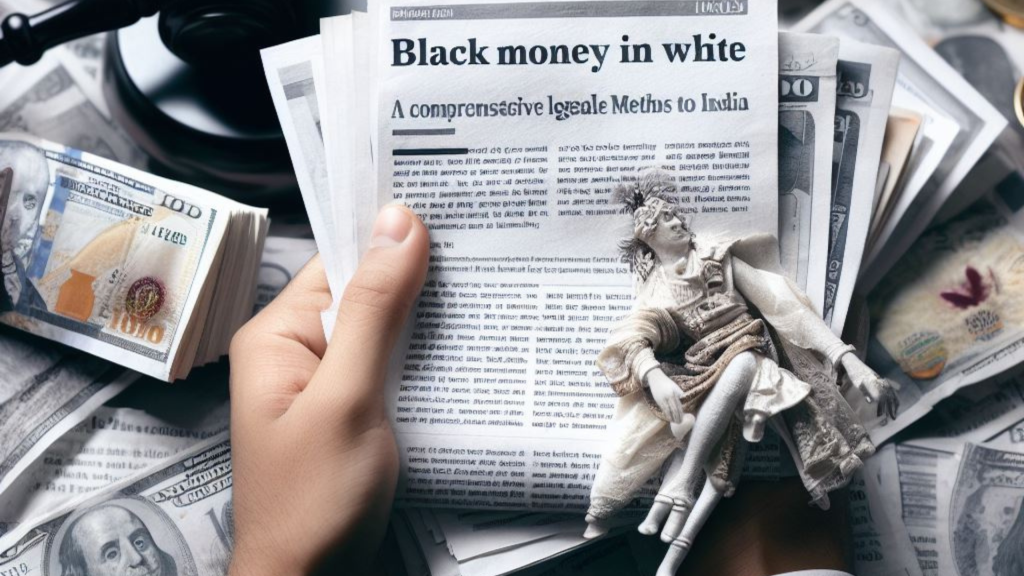Black Money into White “Methods to Convert Unreported Income into Legal Money. Strategies on how to convert unreported income to reported income. Following the ban on Rs 500 and Rs 1000 notes, many individuals seek ways to legitimize their undisclosed income. The recent government initiative by Modi to outlaw these denominations is a commendable step. Consequently, several people are seeking advice from Chartered Accountants (CA) on converting unreported income into reported income. Here, we offer some insights on ways to convert undisclosed income into legitimate earnings.
इस पोस्ट में क्या है ?
Methods for Converting Unreported Income to Reported Income
Understanding Black Money: First, Let’s Define Black Money – Black money refers to income that has evaded taxation, acquired through legal or illegal means. Most of this income exists in the form of cash, undisclosed in financial records, and undisclosed to the government for tax purposes. The majority of black money circulates within the real estate market.
Sources Generating Black Money
Various sources contribute to generating black money. The primary sources include corruption, property transactions, sale of goods or services without proper invoices, and accounting for fictitious expenses.

Generating Black Money via Property Sales: For instance, Mr. Lakshit purchases a property from Mr. Sanjay, transacting a total value of Rs.30 Lakhs. He pays Rs.20 Lakhs via cheque or DD, while the remaining Rs.10 Lakhs is settled in cash. Lakshit only pays stamp duty on the Rs.20 Lakhs, leaving the remaining Rs.10 Lakhs as unaccounted or black money, for which he avoids paying taxes, hence considering it as black money.
Converting Black Money to White Money
Initially, the Modi government provided an opportunity for black money holders to convert their undisclosed income into legal earnings until September 30, 2016, at a tax rate of 45%. However, this scheme is no longer available. If the Income Tax Department discovers any undisclosed income, it imposes a 200% penalty on the earnings.
Currently, there are limited methods available to convert black money to white. While most tips circulating on the internet are invalid, there are a few exceptions. Here are some tips:
Showcasing Agricultural Income: Agricultural income is tax-exempt. Individuals earning black money might obtain fabricated receipts from agricultural traders, portraying sales of agricultural produce. For record-keeping purposes, they may present proof of ancestral property in villages.
Bank Deposits Under Rs.200,000: Some small operators use this method. They open multiple bank accounts and deposit cash amounts less than Rs.40,000 each time, repeating this process up to five times (i.e., depositing Rs.40,000 five times). Notably, transactions exceeding Rs.50,000 require PAN details. Often, these smaller transactions go unnoticed by tax authorities, allowing the conversion of black money to white without paying taxes.
Black Money into White FAQ
A: Black money refers to income earned through undisclosed means, escaping taxation. On the other hand, white money is income reported to tax authorities, subjected to taxation laws.
A: Black money arises from various sources such as corruption, undisclosed property sales, transactions without proper invoices, and fictitious expense accounting.
Previously, a government scheme allowed conversion at a 45% tax rate. Currently, options are limited. Strategies like showing agricultural income or depositing smaller amounts in banks may be used.
The earlier government scheme’s deadline ended in 2016. Presently, converting black money without proper disclosure leads to a 200% penalty if discovered by tax authorities.
Most online tips are unreliable and could be illegal. Few methods might partially convert black money to white, but these are often risky and may involve misrepresentation.